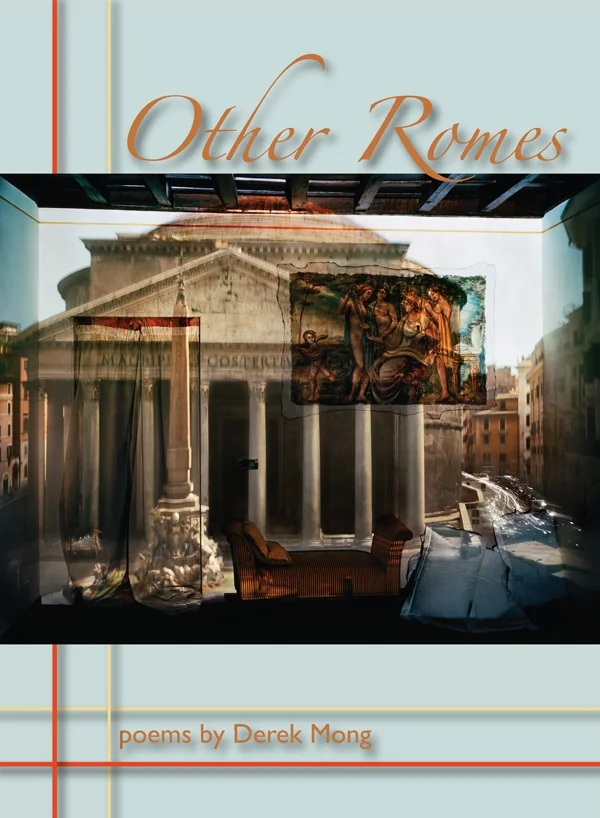When the Earth Flies into the Sun
When the Earth Flies into the Sun weighs digitalization and ecological disasters against the joys of domesticity. Poems speak back to mass shooters and in the voice of cloud storage. They leap from Greek ruins to intergalactic finales, Nebraskan highways to Paleolithic Hominins first learning to speak. At the book’s center are two long poems, “Midnight Arrhythmia” and “A Poem for the Scoundrel Lucian Freud,” that ground these concerns—for art, the other, and the earth—in bodies. The former, addressed to the poet’s son, is part lullaby and part letter. It tries, like a will, to quantify what we leave behind. The latter, addressed to a painter, considers Caesarian birth, ekphrasis, and the casualties of parenting, for both Freud and the poet himself.
When the Earth Flies into the Sun is a surprisingly genial read, but don’t be fooled: that creature has claws in it. There is much here about parenting, and travel, and art (as in the wonderful poem about Lucian Freud that is the volume’s fulcrum). But this is clearly a book of the 21st century; all the poisons we have collectively created, and all the dangers nature expresses seep through. Mong can soar, and he can rhyme, but he can also talk to us human to human, straight on. The family that makes continual appearances—two parents and a child—is wonderfully appealing and terrifyingly fragile. Where will they all be when the century ends, if we make it that far? “Thank god for kids,” the narrator muses. “Kids don’t loathe the species they’re extending.”
-T.R. HUMMER
The Identity Thief
Derek Mong’s highly anticipated new poetry collection, The Identity Thief, is a gathering of voices borrowed and voices lost. These illuminating poems explore how one learns—in an effort to cope, escape, survive, or atone—about the possibilities of becoming someone else. In this collection of poems full of movement and wonder, saints, thieves, environmentalists, new parents, and glaciers all speak. The Identity Thief imagines the pleasures of being an other, using the contemporary dramatic monologue to dazzling effect. The result is a poetry collection full of vision and insight.
"Derek Mong is a poet with a stunningly supple and alert mind, alive to all the risks and possibilities of our present moment. His extraordinary second collection, The Identity Thief, confronts the urgent concerns of the day—shrinking glaciers, garbage flotillas, streets 'bright with constellated smartphones,' our increasingly digitized consciousness—while also registering the tender love for a child: 'to learn how well we’ve doomed the world / will be the task we leave you,' he laments. Here is the resiliency of desire and the persistence of spiritual hunger with plenty of interstitial reverie and music. 'Come approach this page and breathe,' Mong writes, evoking the lyric’s vitality as an ever-necessary art form. Indeed, these pages breathe with the life of a strikingly original and nimble mind-in-motion 'free / in the day’s in-betweens.'"
-Deborah Landau
The Joyous Science: Selected Poems of Maxim Amelin
The Joyous Science offers a comprehensive introduction to Maxim Amelin. The poems span Amelin’s long career and cover his many thematic concerns. A loving collector of neologisms and a devoted student of Revolutionary word-smithing, Amelin keeps his poetry in suspension through a tension of opposites. He writes of bodily pleasures while musing on the body’s resurrection. He is critical of Russia but loves its language. Riddles, odes, and elegies appear alongside a long poem, “The Joyous Science.” This 20-page mock epic chronicles the exploits―both real and imagined―of Jacob Bruce, an astronomer, alchemist, and military strategist to Peter the Great. Amelin is a unique force in contemporary Russian poetry.
“Mong and Fisher have succeeded in finding a distinctive voice in English for Amelin, a poet steeped in the philosophical traditions and poetic culture of Russia. There is poetry in Mong and Fisher’s translation, wrought in judicious and playful word choice, internal rhyme, and with a sensitive ear for song, sense, and soulfulness. There are even places where these translations equal or, perhaps, surpass the original in their crispness and linguistic innovation, making this collection not only a remarkable accomplishment of poetic translation but truly a pleasure to read.”
–Cliff Becker Prize judges: Diana Thow, Anthony Anemone, and Joanna Trzeciak Huss
The Ego and the Empiricist
The Ego and the Empiricist is a 30-page collection that draws on Silver Age, Medieval, Jesuit, and Neo-Latin poets to create—as Robert Lowell said of his experimental translations in Imitations (1960)—“one voice run[ning] through many personalities, contrasts, and repetitions.” It is a plaintive book of dramatic monologues that challenges our ideas about what qualifies as translation, while exploring faith, flesh, wounds, and desire. The Ego and the Empiricist was a finalist for the Two Sylvias Press Chapbook Prize.
"Whatever I take from this forest floor," writes Derek Mong in this gorgeous new chapbook, "I borrow." And, true to this statement, Mong adeptly gathers a wide swath of source material and produces poems that honor their origins, spring off from them, and, ultimately, give back. As Mong explores the journey of the body over time, his lines are both charged and solemn, with turns of phrase at once unpredictable and spot-on. This is a haunting, riveting collection."
— Natalie Shapero
Other Romes
Other Romes gathers together an eclectic range of influences—from Fellini films, to eating contests, Jesuit poetry, and jetliners—to confront the awkward but inevitable relationship between personal narratives and the larger public sphere. And like the title city that haunts much of this work, Mong refuses to settle on any one voice or form. Restrained at times as a Latin ode, or expansive as Whitman, these poems take erotic love and in-flight disaster through subtle, fissuring syllabics, strict sestinas, free verse, and more. The end result is an expansive collection, which as poet and critic David Baker remarks, demonstrates that “the privacy of the lyric world is part and parcel with the communal imagination.”





